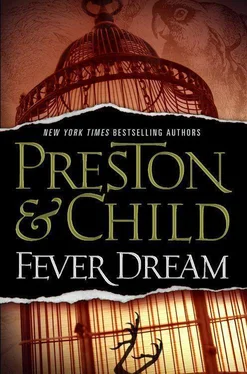Douglas Child - Fever Dream
Здесь есть возможность читать онлайн «Douglas Child - Fever Dream» весь текст электронной книги совершенно бесплатно (целиком полную версию без сокращений). В некоторых случаях можно слушать аудио, скачать через торрент в формате fb2 и присутствует краткое содержание. Жанр: Триллер, на английском языке. Описание произведения, (предисловие) а так же отзывы посетителей доступны на портале библиотеки ЛибКат.
- Название:Fever Dream
- Автор:
- Жанр:
- Год:неизвестен
- ISBN:нет данных
- Рейтинг книги:3 / 5. Голосов: 1
-
Избранное:Добавить в избранное
- Отзывы:
-
Ваша оценка:
- 60
- 1
- 2
- 3
- 4
- 5
Fever Dream: краткое содержание, описание и аннотация
Предлагаем к чтению аннотацию, описание, краткое содержание или предисловие (зависит от того, что написал сам автор книги «Fever Dream»). Если вы не нашли необходимую информацию о книге — напишите в комментариях, мы постараемся отыскать её.
Fever Dream — читать онлайн бесплатно полную книгу (весь текст) целиком
Ниже представлен текст книги, разбитый по страницам. Система сохранения места последней прочитанной страницы, позволяет с удобством читать онлайн бесплатно книгу «Fever Dream», без необходимости каждый раз заново искать на чём Вы остановились. Поставьте закладку, и сможете в любой момент перейти на страницу, на которой закончили чтение.
Интервал:
Закладка:
"It's amazing. But... are you sure it's even by Audubon?"
Pendergast pointed to one corner, where D'Agosta could just see a dim signature. Then he pointed silently to another, dark corner of the painted room--where a mouse was crouching, as if waiting. "The signature is genuine, but more to the point, nobody but Audubon could have painted that mouse. And I'm certain it was painted from life--at the sanatorium. It's too beautifully observed to be anything but real."
D'Agosta nodded slowly. "I thought for sure it was going to be a Carolina Parrot. What does a naked woman have to do with anything?"
Pendergast merely opened his white hands in a gesture of mystery, and D'Agosta could see the frustration in his eyes. Turning away from the easel, the agent said, "Glance over these, Vincent, if you please." A refectory table nearby was spread with a variety of prints, lithographs, and watercolors. On the left side were arranged various sketches of animals, birds, insects, still lifes, quick portraits of people. Lying on top was a watercolor of a mouse.
A gap separated the drawings laid out on the right side. They were a different matter entirely. These consisted almost entirely of birds, so life-like and detailed they seemed ready to strut off the paper, but there were also some mammals and woodland scenes.
"Do you note a difference?"
"Sure. The stuff on the left sucks. On the right--well, it's just beautiful."
"I took these from my great-great-grandfather's portfolios," Pendergast said. "These"--he gestured to the rude sketches on the left--"were given to my ancestor by Audubon when he was staying at the Dauphine Street cottage in 1821, just before he got sick. That is how Audubon painted before he entered the Meuse St. Claire sanatorium." He turned to the work that lay to the right. "And this is how he painted later in life. After he left the sanatorium. Do you see the conundrum?"
D'Agosta was still stunned by the image within the black frame. "He improved," he said. "That's what artists do. Why's that a conundrum?"
Pendergast shook his head. "Improved? No, Vincent, this is a transformation . Nobody improves that much. These early sketches are poor. They are workman-like, literal, awkward. There is nothing there, Vincent, nothing to indicate the slightest spark of artistic talent."
D'Agosta had to agree. "What happened?"
Pendergast raked the artwork with his pale eyes, then slowly walked back to an armchair he'd placed before the easel and sat down before the Black Frame. "This woman was clearly a patient at the sanatorium. Perhaps Dr. Torgensson grew enamored of her. Perhaps they had a relationship of some kind. That would explain why he clung to the painting so anxiously, even when sunk into deepest poverty. But that still doesn't explain why Helen would be so desperately interested in it."
D'Agosta glanced back at the woman, reclining--in an attitude almost of resignation--on the plain infirmary bed. "Do you suppose she might have been an ancestor of Helen's?" he asked. "An Esterhazy?"
"I thought of that," Pendergast replied. "But then, why her obsessive search?"
"Her family left Maine under a cloud," D'Agosta said. "Maybe there was some blemish in their family history this painting could help clear up."
"Yes, but what?" Pendergast gestured at the figure. "I would think such a controversial image would tarnish, rather than polish, the family name. At least we can now speculate why the subject of the painting was never mentioned in print--it is so very disturbing and provocative."
There was a brief silence.
"Why would Blast have wanted it so badly?" D'Agosta wondered aloud. "I mean, it's just a painting. Why search for so many years?"
"That, at any rate, is easily answered. He was an Audubon, he considered it his birthright. For him it became an idee fixe--in time, the chase became its own reward. I expect he would have been as astonished as we are at the subject." Pendergast tented his fingers, pressed them against his forehead.
Still, D'Agosta stared at the painting. There was something, a thought that wouldn't quite rise into consciousness. The painting was trying to tell him something. He stared at it.
Then, all of a sudden, he realized what it was.
"This painting," he said. "Look at it. It's like those watercolors on the table. The ones he did later in life."
Pendergast did not look up. "I'm afraid I don't follow you."
"You said it yourself. The mouse in the painting--it's clearly an Audubon mouse."
"Yes, very similar to the ones he painted in Viviparous Quadrupeds of North America ."
"Okay. Now look at that mouse on that pile of early drawings."
Slowly, Pendergast raised his head. He looked at the painting and then the drawings. He glanced toward D'Agosta. "Your point, Vincent?"
D'Agosta gestured toward the refectory table. "That early mouse. I'd never have thought Audubon drew it. Same for all that early stuff, those still lifes and sketches. I'd never have thought those were by Audubon."
"That's precisely what I said earlier. Therein lies the conundrum."
"But I'm not so sure it's a problem."
Pendergast looked at him, curiosity kindling in his eyes. "Go on."
"Well, we have those early, mediocre sketches. And then we have this woman. What happened in between?"
The glimmer in Pendergast's eyes grew brighter. "The illness happened."
D'Agosta nodded. "Right. The illness changed him. What other answer is there?"
"Brilliant, my dear Vincent!" Pendergast smacked the arms of his chair and leapt to his feet, pacing about the room. "The brush with death, the sudden encounter with his own mortality, somehow changed him. It filled him with creative energy, it was the transformative moment of his artistic career."
"We'd always assumed Helen was interested in the subject of the painting," D'Agosta said.
"Precisely. But remember what Blast said? Helen didn't want to own the painting. She only wanted to study it. She wanted to confirm when Audubon's artistic transformation took place ." Pendergast fell silent and his pacing slowed and finally halted. He seemed stuck in a kind of stasis, his eyes turned within.
"Well," said D'Agosta. "Mystery solved."
The silvery eyes turned on him. "No."
"What do you mean?"
"Why would Helen hide all this from me?"
D'Agosta shrugged. "Maybe she was embarrassed by the way you met and the little white lie she told about it."
"One little white lie? I don't believe that. She kept this hidden for a far more significant reason than that." Pendergast sank back into the plush chair and stared at the painting again. "Cover it up."
D'Agosta draped the cloth over it. He was beginning to get worried. Pendergast did not look completely sane himself.
Pendergast's eyes closed. The silence in the library grew, along with the ticking of a grandfather clock in the corner. D'Agosta took a seat himself; sometimes it was best to let Pendergast be Pendergast.
The eyes slowly opened.
"We've been looking at this problem in entirely the wrong way from the very beginning."
"And how is that?"
"We've assumed Helen was interested in Audubon, the artist."
"Well? What else?"
"She was interested in Audubon, the patient ."
"Patient?"
A slow nod. "That was Helen's passion. Medical research."
"Then why search for the painting?"
"Because he painted it right after his recovery. She wanted to confirm a theory she had."
"And what theory is that?"
"My dear Vincent, do we know what illness Audubon actually suffered from?"
"No."
"Correct. But that illness is the key to everything! It was the illness itself she wanted to know about. What it did to Audubon. Because it seems to have transformed a thoroughly mediocre artist into a genius. She knew something had changed him--that's why she went to New Madrid, where he'd experienced the earthquake: she was searching, far and wide, to understand that agent of change. And when she hit upon his illness, she knew her search was complete. She wanted to see the painting only to confirm her theory: that Audubon's illness did something to his mind. It had neurological effects. Marvelous neurological effects!"
Читать дальшеИнтервал:
Закладка:
Похожие книги на «Fever Dream»
Представляем Вашему вниманию похожие книги на «Fever Dream» списком для выбора. Мы отобрали схожую по названию и смыслу литературу в надежде предоставить читателям больше вариантов отыскать новые, интересные, ещё непрочитанные произведения.
Обсуждение, отзывы о книге «Fever Dream» и просто собственные мнения читателей. Оставьте ваши комментарии, напишите, что Вы думаете о произведении, его смысле или главных героях. Укажите что конкретно понравилось, а что нет, и почему Вы так считаете.











